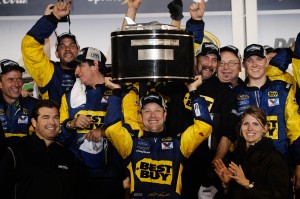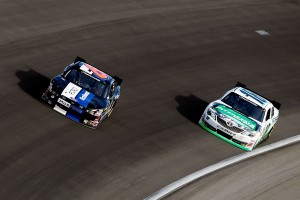Click “Like” to share this with your friends!
Jerry Punch doesn’t just play a doctor on TV. He is one—not one of those PhD types who earns the title by writing a thesis on an educational discipline of some sort. No, Punch is a bona fide doctor who spent years toiling in the intense environment of the emergency room while simultaneously pursuing a career in sports broadcasting. Punch is now closing in on 30 years with ESPN where he has mostly covered college football and NASCAR.
In this sit-down interview with Punch, he talks about, among other things, how he wound up on two very different career paths, how stock car racing has evolved from a safety and medical perspective, how his faith has sustained him through difficult situations, and what he enjoys most about NASCAR:
Chad Bonham: How did you end up being both an ER doctor and an ESPN broadcaster?
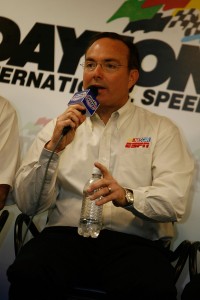
Dr. Jerry Punch: Growing up in the mountains of rural North Carolina, a lot of us from those small town areas had dreams that we were going to be a lawyer or a doctor or be a sportscaster and I sort of had all those—the lawyer part no so much. That’s where you have to have hope and faith. That’s where it all started many years ago. You sit around and hope and pray that things work out. I was very blessed to have the opportunity to go to college and go to medical school. I grew up around race cars when I was a kid. I worked in race shops as a teenager, building race cars, building engines, working with some of the legendary drivers that ran years ago—Tommy Houston, Harry Gant. I had an uncle—actually, I called him my uncle—named Bobby Isaac. We adopted him into our family. He wasn’t really my uncle, but he was a NASCAR champion back in 1970. So I’ve been around racing since I was a kid.
When I went to medical school, I couldn’t drive anymore on the short track. It was too risky that I’d get hurt, but the local track promoter Ned Jarrett allowed me to come up there and work with him in the tower on Saturday nights and run the scoreboard and do stats. One night, Ned was gone and he didn’t have an announcer. The announcer he had hired didn’t show up. Ned was being inducted into the Hall of Fame at Darlington. His youngest son Dale comes running up the stairs to the tower yelling, “We’ve got a packed house and nobody to announce!” Dale was young and he was shy—imagine that, as good as he is now on the air—and he says, “I’m not announcing.” So I picked up the microphone and did the show. Next thing you know, I’m doing PA regularly and I’m traveling with Ned some weekends to do radio broadcasts and Ned would get me on the radio. That’s how it came about.
So then I got out of medical school and became an ER doc. You’ve got to have a strong faith to stand over a bed in a trauma situation or critical situation knowing that person may take their last breath in front of you. We’ve had some situations at the racetrack where I’ve been forced to be involved as a doctor to some of the drivers. I’m very blessed that the outcomes so far have been very good.
Bonham: I assume that Rusty Wallace is pretty happy that you’re an ER doctor (read about that story HERE).
Punch: You don’t think about what could have happened until later when you sit back and look at the details of what would have happened had we not been able to get an airway open for him. We feel very blessed. I always look back and tell Rusty that after that happened I had so many drivers like Dale Earnhardt who were friends with Rusty that said, “You saved Rusty’s life. Why? Why would you do that?” We’d all laugh about it jokingly, just picking on Rusty. But we were fortunate that it happened that way.
Bonham: From a medical perspective, how much safer is the sport and are you amazed that there weren’t more deaths before many of these safety measures were added?
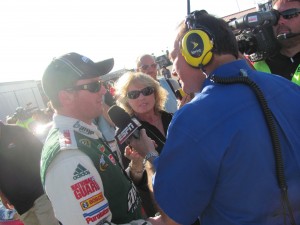
Punch: You know the old saying, “What you don’t know won’t hurt you.” Back in those days, we didn’t know how easy it was to get injured in these cars and what we could avoid. Of course, the speeds have crept up and the cars are different. But the whole sport has changed. This whole sport has evolved from the car itself to the safety parameters. The seat has been moved over. We have the head and shoulder supports now and the neck braces. We no longer have the lower extremity fractures and the pelvis and lower leg snapping because the support is there. We no longer have the serious rib injuries that we used to have. The Hans head-neck device keeps that area supported. We have the crush zone on the front of the car and the safer barriers. But aside from the physical parts of it, the drivers themselves are a different breed now. There’s a focus on fitness—staying fit, eating properly, getting rest. The sport has come a long way. Back in the day, the old saying was, “The tires are skinny, the drivers are fat.” And now the tires are fat and the drivers are skinny. It’s a different world here.
Bonham: Tell me about your faith journey.
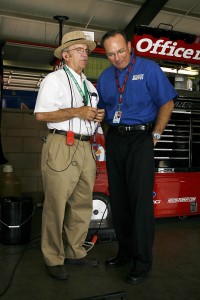
Punch: I grew up in a Lutheran church. I’ve been told that my great-great-great grandfather was a circuit-riding minister and he rode a horse or a mule across the hills of North Carolina and Tennessee. Back then you would preach every few weeks in a little country church. I was an altar boy growing up in the Lutheran church and when I got married to Joanie, she was Catholic, so went through a year-long program to understand the Catholic faith and I converted.
My faith goes back to growing up in difficult times. God never gives you more than you can handle. There were nights in the emergency room when I’m seeing terrible tragedies with families and children and things in mind that should never happen. I’m feeling so helpless. I’ve got to have someone that I can turn to in order to find peace. I’ve got to be the strong one. I’ve got to be strong for the nurses around me. I’m in charge. I’m the ER director. I’m a chief-of-staff of this medical center. I sat atop a hospital once in Bunnell, Florida with our administrator and a National Guard pilot. There was fire burning around all four sides of our hospital. There were these big fires in Central Florida. There was fire within eight miles on one side and fire within 12 miles on another side. We’re sitting there trying to make a decision whether to bring in the National Guard and evacuate all the patients or whether we stay there. You run a risk taking some of those people out of ICU. No one makes that decision but me. I’m the chief of staff. I’m making a decision that’s going to impact a lot of lives. If you don’t know how to turn to a higher power and you don’t know how to find peace in prayer and ask for guidance, then, you really are lost.
I remember one night in particular, I had done a Thursday night football game somewhere on the West Coast. I red eyed all night to get to Darlington on Friday and I hosted qualifying on ESPN. That night, I went to my hotel and I was exhausted. I hadn’t been to sleep. I did notes on the plane all the way over. Now, I had to prepare to do what was then the Busch (Series) race the next day. I was sitting in my room with a cup of coffee and I’m trying to stay away and it’s like 9 o’clock on Friday night. I called my wife and said, “I don’t know if I’m going to make it. I’m doing the best I can.” And she said, “Look, you just put what happens tomorrow in God’s hands. Close your books. Close your notes. Put them away and go to bed. Just have faith that what needs to happen will happen.” There was an incredible peace in that.
Bonham: What are your thoughts on NASCAR’s commitment to on-site ministry and public prayer before the race?
Punch: I think it’s wonderful. It’s absolutely wonderful. It wasn’t many years ago that many networks would go to commercial and not show the prayer and not play the anthem. But there is no more patriotic sport in terms of showing the loyalty and patriotism for this country than NASCAR. And this sport is very open about showing faith. The risks here are considerably higher. If you hang a curve ball up high, it’s going to cost you a dot or two on your ERA. But in this sport, if you make a mistake up high, it can cost a lot. So NASCAR openly allows shows of faith, family and future.
Bonham: And what are your thoughts on how the drivers often receive prayer from a chaplain right before they go out on the track?
Punch: The (Motor Racing Outreach) people go car to car. It’s done very subtly on Sunday morning. The MRO ministers will be out on the grid and they’ll go car to car and they’ll bow with a short little brief prayer by the window. Dale Earnhardt and Teresa were always there. Darrell Waltrip and Stevie always received prayer. There are groups here today that want a quick, “Lord thank you for this day and bless us and let us come home safely.” So I think this sport is not afraid to step up and say, “We are proud of who we are.”
